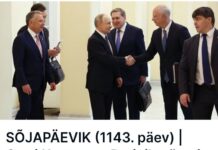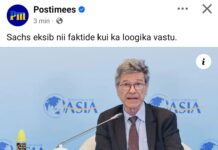Pakistan’s Inter-Services Public Relations reported on Wednesday that Chairman of the Joint Chiefs of Staff Committee General Sahir Shamshad Mirza held talks in Moscow with Russia’s Deputy Defense Minister, Deputy Secretary of the Security Council, and Deputy Chief of the General Staff. According to their press release, trade, connectivity, and military-technical cooperation were discussed, but not much is expected to come from their meeting, especially on the military-technical front.
It was explained earlier in the month why “Pakistan Remains Reluctant To Comprehensively Expand Ties With Russia”, namely because it doesn’t dare defy the US on significant issues like clinching a strategic energy pact, instead remaining content with symbolic abstentions from UNGA votes on Ukraine. As for military-technical cooperation, Russia is content with annual joint anti-terrorist drills and sharing information about Afghan-emanating regional terrorist threats, neither of which offend India.
About that country, it’s Russia’s decades-long special and privileged strategic partner, and “Modi’s Trip To Moscow Was Much More Important Than Most Observers Realize” since it represented the end of the pro-BRI policymaking faction’s brief but astronomical rise in influence over the past year. To elaborate, this group believes that a return to Sino-US bi-multipolarity is inevitable so Russia should turbocharge China’s superpower trajectory as revenge against the US for everything that it did since 2022.
Their ”friendly rivals” are the established balancing/pragmatist faction which fears potentially disproportionate dependence on China and prefers relying on India as a counterweight to the People’s Republic. This group’s influence waned over the past year as the pro-BRI faction succeeded in sending eight strong signals hinting at an impending Russian pivot towards China, which were enumerated here and were the reason why Indian Prime Minister Narendra Modi came to Moscow on such short notice.
He sought to assess the reliability of Russia’s geopolitical balancing act amidst those troubling signs and was relieved to find out during his three-hour-long informal talks with President Putin that it’s back on track as a result of the three Asian moves over the past month that were described here. The Russian leader’s trips to North Korea and Vietnam, the progress made on clinching a reciprocal military logistics pact with India, and his hosting of Modi all showed that the pro-BRI faction is now under control.
That group was also very pro-Pakistani as naturally follows from its Sinocentric worldview so it’s highly unlikely that they’ll now be able to convince policymakers to scale military-technical cooperation with Pakistan as a result of Mirza’s visit. Interestingly, his trip to Moscow followed Modi’s, though that’s just scheduling coincidence since the Indian leader’s was on short notice while the Pakistani General’s was planned longer in advance.
It’s unimaginable that Russia would disrespect India by enhancing military-technical cooperation with Pakistan, let alone right after Modi’s visit and following the sudden decline of the pro-BRI faction’s policymaking influence, so experts like the RAND Corporation’s Derek Grossman are totally wrong. He tweeted an article about Mirza’s visit and wrote that “Russia continues to flirt with Pakistan”, but he’s been trolling Indians for a while already and was probably trying to bait them into reacting once again.
Like most of his ilk, Grossman isn’t an objective expert but an informal lobbyist who abuses his academic and professional credentials to advance certain agenda, in this case trying to divide Russia and India as part of the US’ doomed-to-fail plot. To that end, his deliberately misportrayed Russia’s intentions in hosting Mirza, which were to retain cordial relations and explore whether Pakistan is serious about scaling their energy and trade ties, not sincerely discuss more military-technical cooperation.
That last-mentioned subject was only discussed per protocol considering Mirza’s position, though his intentions might have also been to see whether Pakistan can drive a wedge between Russia and India in line with his US-aligned country’s agenda. There’s no realistic chance that Russia will throw away its newly enhanced special and privileged strategic partnership with India just for the sake of making a few extra bucks by exporting more advanced military-technical products to its hated Pakistani rival.
It wouldn’t even consider this even in the best-case scenario that Pakistan clinches their long-negotiated strategic energy pact and these two ramp up real-sector trade between them. There are very clear lines that Russia won’t cross with Pakistan out of respect for India, and meaningfully strengthening military-technical ties is at the top of the list. Anyone who nowadays thinks otherwise either doesn’t appreciate India’s privileged role in Russian grand strategy or is deliberately trying to divide those two.
























